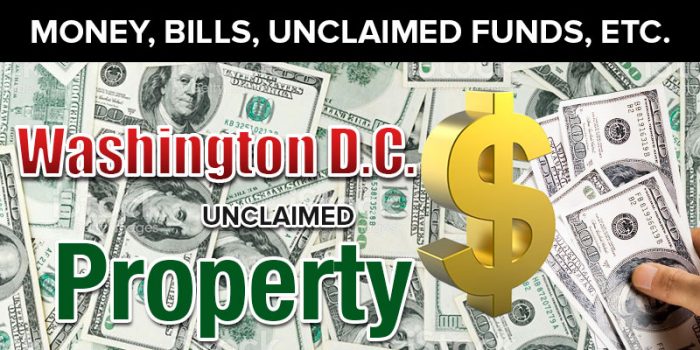
Contents
While the United States only 50 states, it has a number of territories where U.S. citizens live. One of these is the District of Columbia, and, while the District of Columbia does not have the same type of structured state government that you would find in a state, it does have government set up to help its citizens, including an unclaimed property program. The District of Columbia’s unclaimed property program is handled by the Office of the Chief Financial Officer, which is in charge of the Office of Finance and Treasury. The full name of the program is the Office of Finance and Treasury’s Unclaimed Property Unit. This unit is responsible for collecting assets, attempting to find former and current residents, and making the information about those assets available in the District’s unclaimed property database.

Search Public Records
Some people are confused about what unclaimed property means, and whether anyone can claim the property. While it may be called unclaimed money, a better descriptor is abandoned property or even lost property. That is because unclaimed money is not “up for grabs.” It has an identified owner. The reasons it is considered unclaimed is because a third party, referred to as a holder, has possession of the property and has lost contact with the property’s identified owner.
There is some confusion about what unclaimed money is. Some people think that unclaimed money or unclaimed property are assets that have been abandoned by their owners and are up for grabs. While unclaimed money and property are abandoned property, the property still remains the legal property of the property owners. It is considered unclaimed money because the holder who has control of the money has lost contact with the property owner for a statutory period of time. Property is usually abandoned not because property owners want to abandon it, but because they have forgotten that they have the property. Since unclaimed money is really forgotten money, we think everyone should search for unclaimed property. After all, if you remembered that you had it, it would not be lost!
A number of different types of property can be classified as unclaimed property. While it generally refers to intangible personal property, it can also refer to tangible personal property. In addition, it is property that is put in the custody of a third party. Some examples of unclaimed property include: money in checking accounts, money in savings accounts, customer deposits, customer overpayments, gift certificates, insurance benefits, paid-up life insurance policies, certificates of deposit, unpaid wages, commissions, uncashed checks, death benefits, dividends, money orders, insurance payments, refunds, stocks, bonds, and property in safe deposit boxes. While the property in safe deposit boxes may be unclaimed property, it is important to realize that it is not generally held for the claimant. Instead, the property is sold and the proceeds of the sale are then held for the claimant.
While many states and U.S. territories use the Missing Money website to run their missing money programs, the District of Columbia actually operates its own website. If you are searching for money in other locations, you may want to include Missing Money in your search. You can visit them by going to: www.missingmoney.com.
Looking for missing money in the District of Columbia is very similar to running a missing money search in most other states. Even though states may use their own programs, the search methodology remains fairly consistent from state to state. You can find out more by following along with a search in this complete tutorial. It will show you how to run a search, and you can even look at screen shot photos of the search to help you know exactly what to do. You can apply many of these same techniques to searches in other states, or you can look at our state specific tutorials for more help.
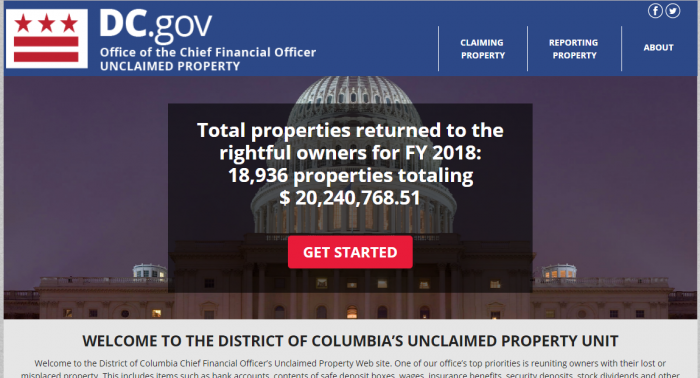
Washington D.C. Unclaimed Property Database
When you search for unclaimed property by state, the state website consolidates information from all of the different counties in the state. The District of Columbia is not divided in counties or territories. Therefore, while it provides information for the entire territory, you will not find information for political subdivisions.
Every state and territory has a specific definition of unclaimed money. These definitions are fairly consistent, despite being state-specific. Generally, unclaimed money is money that has been lost or abandoned by the actual owner and is in the possession of a third-party, which is called a holder. Examples of holders include banks, financial institutions, and other businesses. The big difference between the laws has to do with what time periods the states apply before a property can be considered abandoned.
How Much Unclaimed Money in Washington D.C.?
The District of Columbia does not publicize how much missing money is available for potential claimants, a figure that would be constantly changing, anyway, as holders report unclaimed money and property owners make claims for their money. It does, however, state that it has returned over $20 million in unclaimed property to the rightful owners in fiscal year 2018. This is only a small portion of the unclaimed property available in the United States. The National Association of Unclaimed Property Administrators (NAUPA), an organization devoted to helping people locate their unclaimed money, estimates that there is around $42 billion available in unclaimed property available in the United States.

Search Public Records
Washington D.C. Unclaimed Money Finder
You can access the District of Columbia’s own unclaimed money finder. In addition, the District of Columbia has made its information available at www.MissingMoney.com. If you choose to use the Missing Money website, you can simultaneously search for property in the following states, territories, and provinces: Alabama, Alberta Canada, Arizona, Arkansas, Colorado, District of Columbia, Florida, Idaho, Illinois, Indiana, Iowa, Kentucky, Louisiana, Maine, Maryland, Massachusetts, Michigan, Minnesota, Mississippi, Missouri, Montana, Nebraska, Nevada, New Hampshire, New Jersey, New Mexico, New York, North Carolina, North Dakota, Ohio, Oklahoma, Puerto Rico, Rhode Island, South Carolina, South Dakota, Tennessee, Texas, Utah, Vermont, Virginia, West Virginia, and Wisconsin. For the purposes of this tutorial, we are running the search from the District of Columbia’s unclaimed property page:
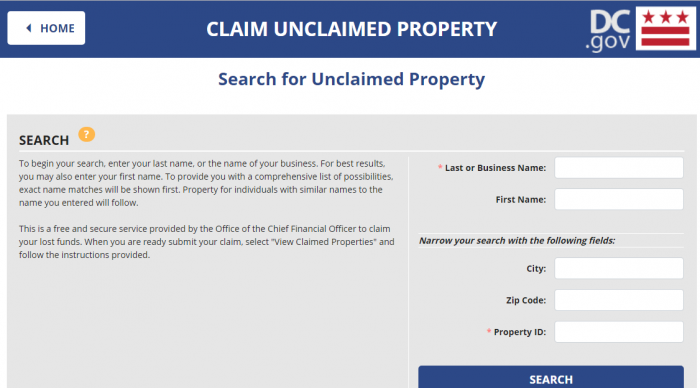
To start your search, you are asked to provide your last name or a business name. You may also add some additional qualifiers to help you narrow your search. These include your first name, the city, the zip code, and a property ID number.
We try to remain consistent across our tutorials, so that you can easily apply what you have learned in one tutorial to a search in a different state or territory. For that reason, we use the same name, Bob Smith, for all of our tutorials. Not only does this provide consistency, but the use of a common name lets us show you how to handle it when your search returns too many potential results. f there will be so many results for your search that it is impossible to go through all of them.
In the District of Columbia, your search can turn up a maximum of 1,000 results. When we look at the results just searching for the last name Smith, we see that we get at least 1,000 results and that we do not see all of the potential results:
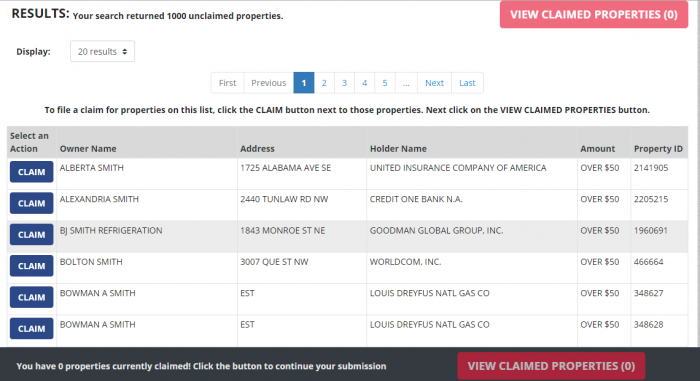
The easiest way to narrow down search results is by looking for the first name with the last name. Depending on where you are searching, this can really result in a significant difference for your search results. However, in D.C., it does not really make a difference. There are still at least 1,000 results:
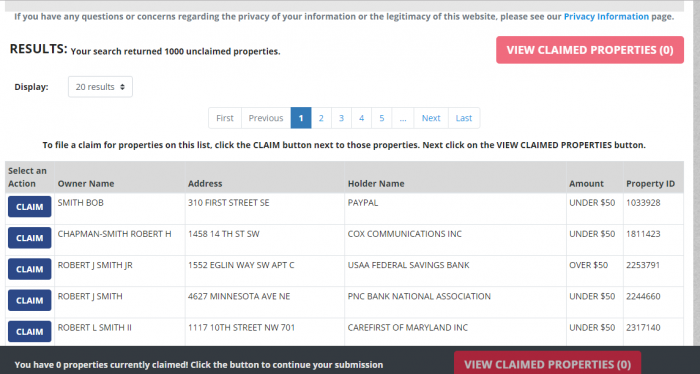
Normally, if we had this many results for a simple first and last name search, we would narrow down the results by adding a city name. In the District of Columbia, there is only one city name, so that is not going to help narrow down our results. Instead, we can try to further narrow the search by adding a zip code to the search. We chose to use 20001. That narrowed the results down from over 1,000 to 443. While this is still not an ideal number of results, it does make the search more manageable:
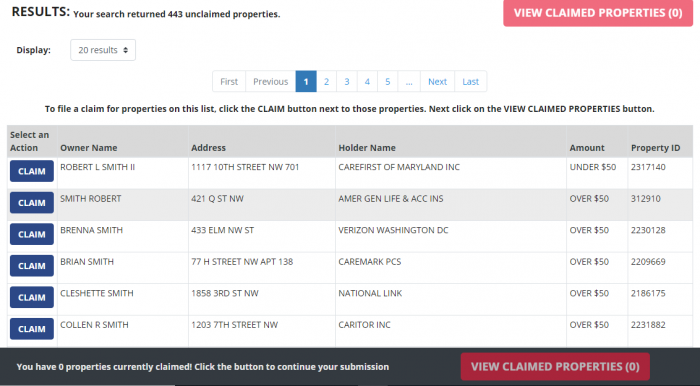
While 443 may still seem like an unmanageable number of hits, looking at the results reveals that the results include other Smith results besides Bob. In fact, there are no Bob results. If there were, they would be at the top of the search results. There are two Robert Smith results. Therefore, this has resulted in the search results being manageable.
Once you have your desired search results, you can look at the property description. These are fairly uniform across the different searches for all of the various states. You find a claim button on the left, the property owner’s name, the property owner’s last known address, the name of the holder, the amount of the property, and the property ID number.
To claim the property, you will hit the blue “claim” button that is on the left. When you do, you will notice that the claim button disappears, and you get an option to “remove” the claim instead:
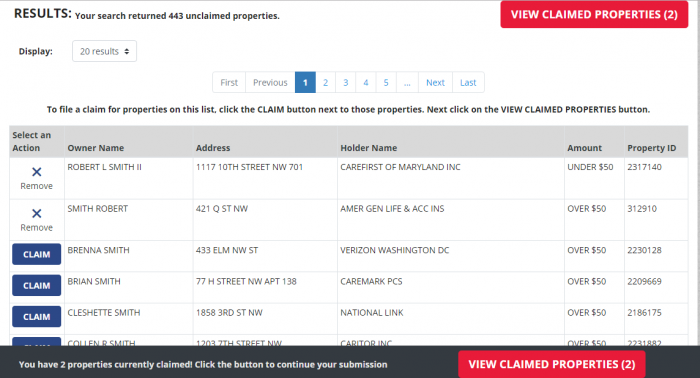
If you have mistakenly added a property or want to remove a property for any reason, you would just hit the blue remove button to have the property removed from your claimed property list.
After you have found every property that you want to claim, you can look over your properties by going to the “view claimed properties” button located on the top right of the page. You will find another button located on the bottom right of the page. After you have claimed the properties, you will see a page that looks like this:
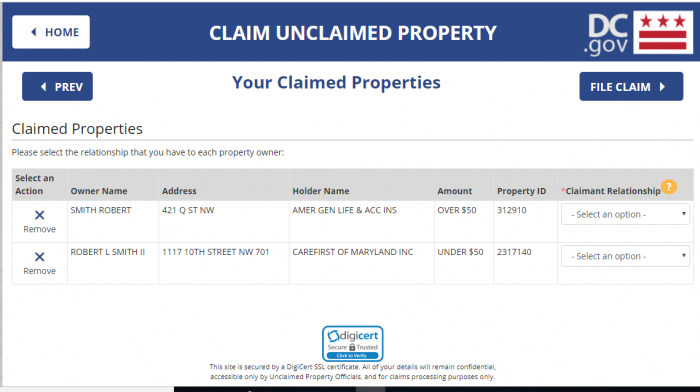
You will notice that you are asked to identify your relationship to the claimant in order to claim the properties. The options you have include: owner, estate representative, heir, or business. Choose the appropriate relationship for each claim:
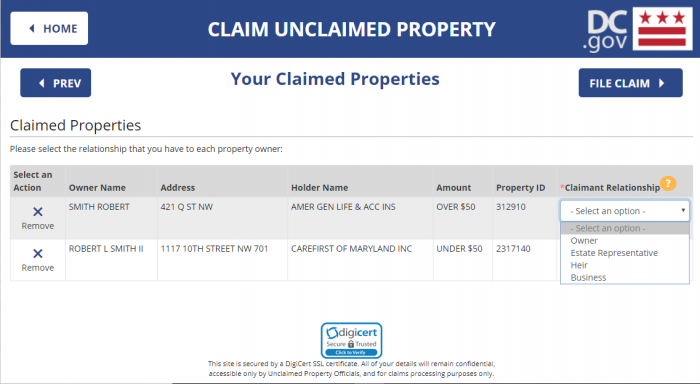
If you want to claim all of the properties, you can proceed to the file claim button, which is located on the top right of the page. Doing so takes you a claimant information page, where you are asked to include information such as your first name, last name, address, postal code, city, province or state, country, email, and phone number:
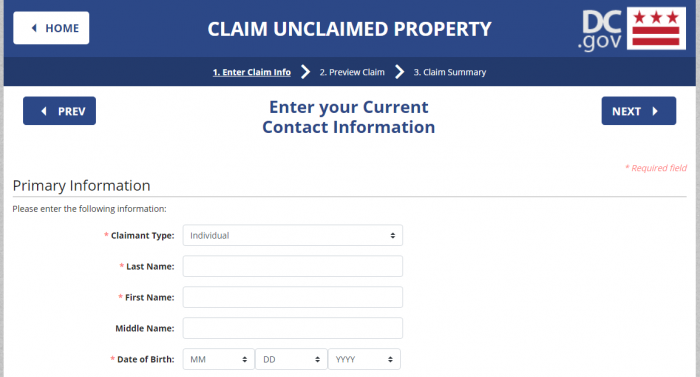
After you have filled in the claim information form, you will receive a notification of what type of proof you need to provide in order to proceed with your claim. Generally, you will at least be asked to provide proof of your identity, as well as proof that you resided at the address listed on the claim.
Unclaimed Property Laws in Washington D.C.
The District of Columbia’s Unclaimed Property Law is located in DC ST41-101.
Washington D.C. Unclaimed Money FAQ
How long does the District of Columbia hold unclaimed property?
The District of Columbia will hold money indefinitely for the rightful owner.
Examples of Unclaimed Property
Almost any type of personal property can be unclaimed property, though two major exceptions are real property and motor vehicles. Frequent examples of unclaimed property include money in bank accounts, stocks, bonds, uncashed checks, unpaid wages, and items in safety deposit boxes.
Does DC make efforts to locate owners?
The District of Columbia does not have the same outreach efforts that you find in many states, but it does make unclaimed money searchable on its database and it does participate in the Missing Money database.
Other sources to search besides the DC unclaimed property database?
One of the biggest mistakes that people can make is starting and ending their unclaimed property search in the same location. Many people only look in the state or territory where they reside. However, for most people, the unclaimed property search process should be more involved. You may need to look in additional states or territories, and you probably need to include some national sites in your search.
When making a list of states you should search, think about any state where you have lived, any state where you may have established business contacts, and any state where someone may have put money in your name. The District of Columbia is on the Missing Money website, so you may be able to search multiple states or territories simultaneously.
In addition to looking at states and territories, you may also need to look at some national sites. That is because some money never escheats to the state, but states in federal level sites. Even in the District of Columbia, despite it being a national territory, you would have to look at the national site to find that missing property. The four sites we suggest most people include in their unclaimed property search are: the Internal Revenue Service (IRS), the Pension Benefit Guaranty Corporation, the U.S. Treasury, and the Life Insurance Policy Locator.
The IRS processes more individual’s money than any other holder in the United States. However, it has a policy of not forwarding income tax refunds if a person has changed address after filing their income taxes. You can read more about this policy on the IRS’s website:
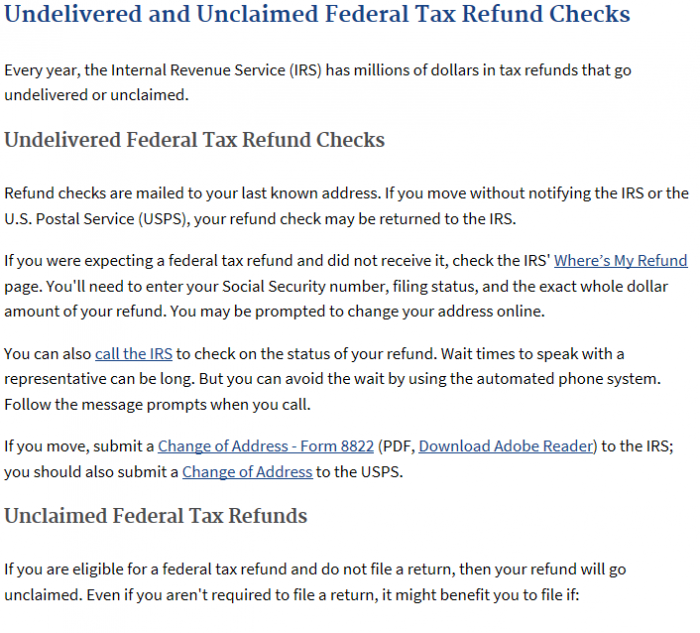
Fortunately, if you think you should have received an income tax refund, but have not received it, you can head to the IRS’s Where’s My Refund? page to locate it:
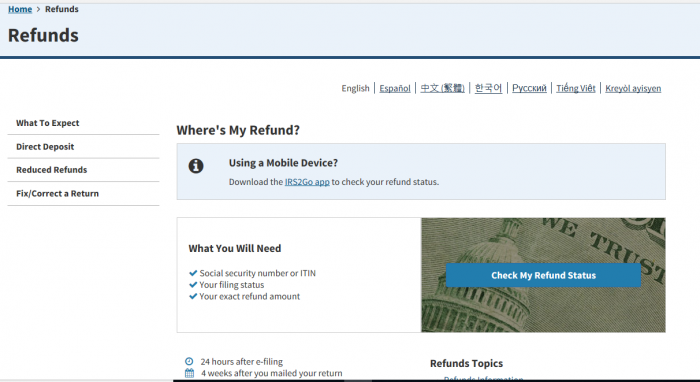
The IRS is not the only major holder in the federal government. The U.S. Treasury also holds a huge amount of money for Americans. Unlike taxes, you may not even realize that the Treasury ever held money for you, because many people purchase U.S. Savings bonds as gifts for other people. Unfortunately, the Treasury recently discontinued its easy to use searchable database. Now, if you want to track down missing bonds, you need to contact the U.S. Treasury for more information. You can call them at 844-284-2676 or visit them online at the Treasury Direct website:
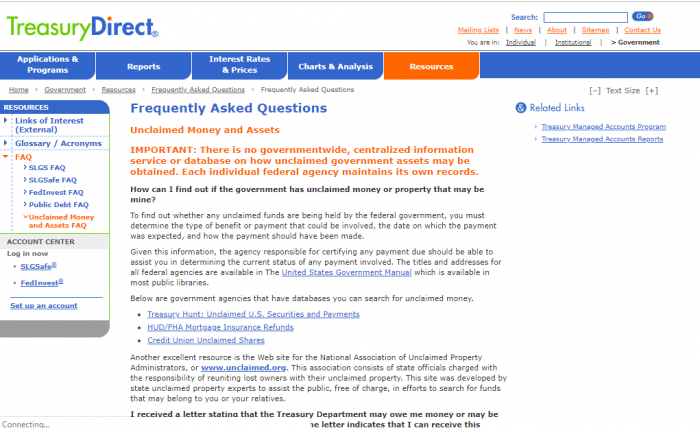
A third government agency that might be able to help you find your unclaimed money is the Pension Benefit Guaranty Corporation (PBGC), which is a government-run corporation that guarantees private pension benefits. The PBGC operates a searchable database that helps people locate missing pension benefits:
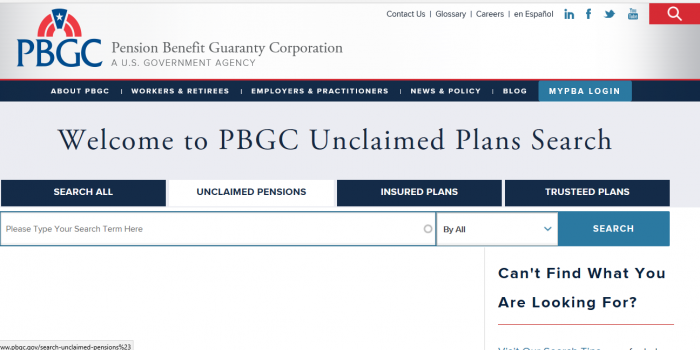
The fourth site we suggest you search is not a government site, but does operate on a national level. It is a service of a national conglomeration of life insurance companies known as the National Association of Insurance Commissioners’ Life Insurance Policy Locator Service. While this service does not provide a searchable database, it does allow you to put your information into their system. It then distributes that information to its member agencies, which check their records to see if you are the beneficiary of any unpaid insurance policies:
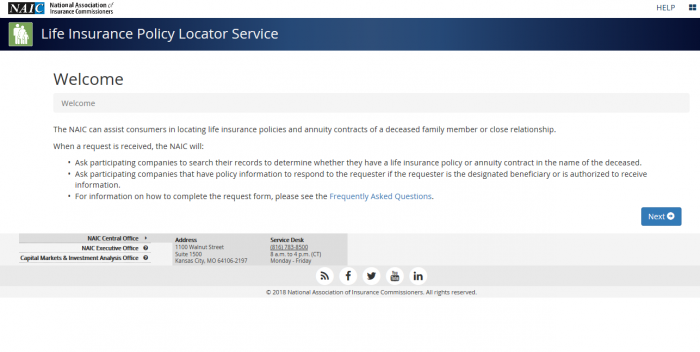
While not everyone needs to look at some additional federal sites, there are several other federal-level holders of money. Depending on your history, you may want to look for unclaimed money at: the FDIC, the Department of Housing and Urban Development, the National Credit Union Administration, and the Veteran’s Administration Benefits Department.
What is the best way prevent my property from becoming lost or unclaimed?
The best way to prevent property from being considered lost or unclaimed is to keep in regular contact with your financial institutions. To do this, it helps to keep detailed account records and set up reminders to contact your holders on a yearly basis. In addition, use electronic account management when it is available.
How do I make sure my heirs know where my assets are if I die?
You need to appoint a trusted individual to access your financial records if you die or are incapacitated, and leave that individual information on how to do so. A will does not tell your heirs how to locate your assets.
Should I hire a finder to conduct the search?
The District of Columbia encourages people to check their website before hiring a finder service, because finder services can result in you being charged significant fees, while the process of searching for and claiming unclaimed property is free in the District of Columbia.
Why does DC take possession of unclaimed property?
As with other states and territories, DC takes possession of unclaimed property for two reasons. The first reason is consumer protections; consolidating unclaimed property into a single database makes it more likely that the property will be recovered. The second reason is economic; by taking possession of unclaimed property, the District can use it to create revenue until it is claimed by its rightful owner.
Conclusion
The District of Columbia has a surprising amount of unclaimed property, probably because it has a frequently-changing population. It is one of those territories that many people will want to include in their property searches.